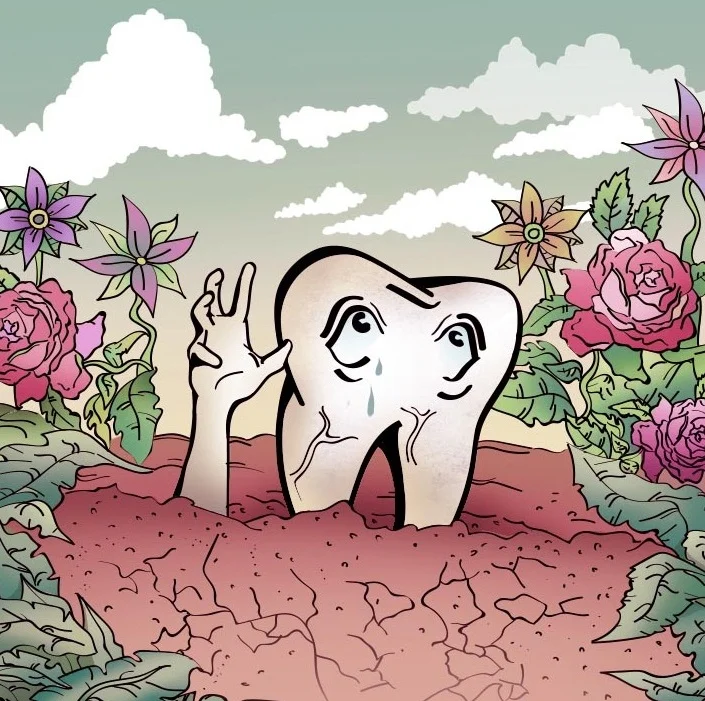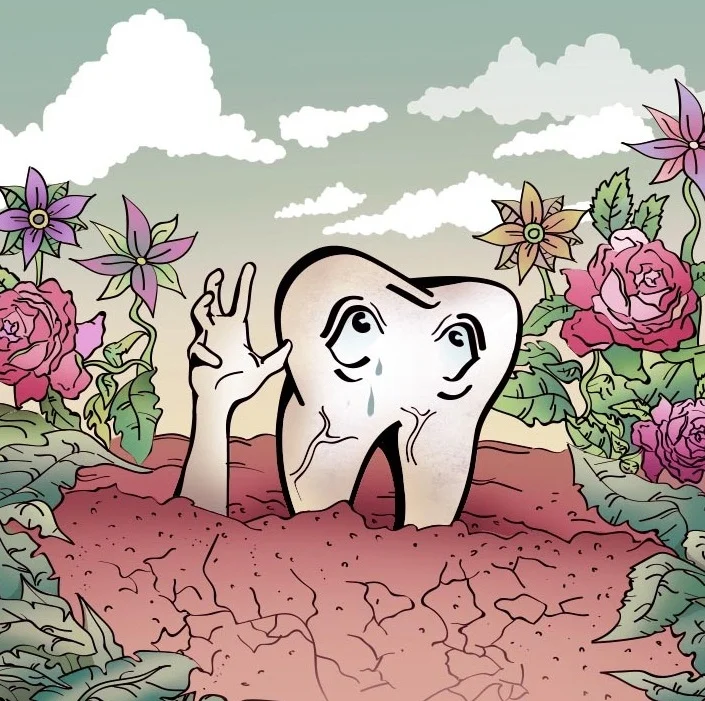Losing a Piece of Tooth and a Lot of Negative Energy
Sometimes our bodies physically cling on to things. And, when we expel them years later, it can be cathartic (and kind of gross).
By Susannah Cohen
Art: Zita Walker
At first it just felt like there was something stuck in my teeth, right in the back. I prodded at it with a fingernail but it wouldn’t dislodge itself.
Later, over dinner, I could feel a growing pressure against my last molar, and poking at it did nothing to lessen the pain.
Over the next few days, the mysterious mass grew bigger. I eventually used a hand mirror and opened my mouth wide to get a better look at it. Whatever it was looked half black, half white.
Hard to the touch, it was coming out of my gums and pushing into its nearest dental neighbor. If I hadn’t known better, I would have sworn I was growing another tooth.
I was.
A dentist confirmed it a week later. “It’s a piece of old tooth,” she announced, as she prepared to give me a numbing injection before extracting it. “I can see why it was bothering you.”
Apparently this piece of old tooth had been hiding in the depths of my lower jaw for the past 25 years. It was a stubborn relic from when I had my wisdom teeth removed in my early twenties that must have been left behind during the procedure.
It’s not uncommon to leave a bit behind after difficult extractions, and, given that I woke up with two black eyes and a chest full of bruises, mine qualified as a difficult extraction. When this happens, it usually takes weeks or months for the shards to worm their way out of the gum — not years, let alone decades.
Theoretically, the tooth could also have stayed down in the depths of my mouth forever, doing me no harm. But it didn’t, and I couldn’t stop wondering why, after all this time, it had finally made its escape? I have a theory.
I’m in my forties with two teenage daughters, and for the past 25 years, I’ve lived in London. That is, until last September when my husband and I decided to move to California — he for work, me for an enforced career break. I know I sound like a hippy, but in the short amount of time since my move, I’ve started, quite simply, to let go.
Instead of constantly worrying about the next thing on my to-do list, I’ve been able to consciously relax. At any given moment, you’re likely to find me either looking out at the ocean with a smile on my face or enjoying a downward dog yoga pose. I no longer swear like a sailor — in fact, I no longer swear at all. I keep a daily gratitude journal, where I write down everything that made me happy that day. (In a recent entry, I listed “the kid who treated us to a silent disco while riding the Muni.”)
Any bitterness and tension I’d held onto from my past life — the accumulated, low-level stress of a twice-daily 90-minute commute, office politics, guiding two teenagers through the minefield of adolescence, the mysterious leak in the ceiling of our house whose source could not be traced — have been purged. And I believe I was able to get rid of it all through my wayward tooth piece.
It was a physical manifestation of all the negative energy I had left behind. It was my body letting go.
Though it makes sense intuitively, I thought I’d do some investigating into whether this theory holds any weight. What does science say about physical manifestations of stress in our bodies — and what happens when we let them go?
It turns out it’s not that uncommon for our bodies to expel foreign objects years later. One of the most well-known stories about this phenomenon involves a a Swedish tattoo artist in the 1970s who lost a tattoo needle in his arm, only to have it emerge, 40 years later, from his toe.
Former soldiers who’ve gotten shrapnel stuck in their bodies have also experienced similar purges.
A British war veteran named Alfred Mann hit the headlines in 2009 when a piece of metal emerged from his jaw 65 years after getting injured in an explosion in Italy during World War II. At the age of 87, the man’s mouth swelled up, and a dentist incorrectly told him it was just an ulcer. Instead, he woke up one morning to find the shrapnel in his mouth.
And guess what? He was a changed man after losing it. While he understandably felt more cheerful after finally being able to open his mouth properly again (he had had difficulty speaking and eating for all these years), the incident also, quite literally, loosened Mann’s tongue.
“It’s strange,” his wife Constance told the Birmingham Mail. “He has never talked about the War this much before. I never knew half the stories he has told me in the last couple of weeks. It took him all these years.”
In somatic work, there is a strong emphasis on the mind-body connection. Peter Levine’s influential ‘90s book Waking the Tiger argues that unreleased emotions hang around inside the body as reminders of past trauma, and it advocates physical action, not just words, to help patients heal.
Jung’s concept of synchronicity — when a state of mind coincides with the material world — can also be used to explain my tooth transformation. He, too, believed there is a connection between the psychological and the physical, coining the phrase “meaningful coincidences” to describe when something in the psychic realm — a thought or a dream — meets its material counterpart.
“It is not only possible but fairly probable, even, that psyche and matter are two different aspects of one and the same thing,” he wrote in On the Nature of the Psyche.
Who’s to say that my experience was not one of his “meaningful coincidences” — a happy connection between the thought (goodbye, stress) and its physical manifestation (hello, tooth)?
More prosaically, there is a connection between oral health and stress. Demi Moore revealed to Jimmy Fallon on The Tonight Show last year that she lost two of her teeth due to stress, and there are certainly studies suggesting a link between stress and gum disease — the number one cause of tooth loss in adults.
Of course, teeth are not the only things that can be expelled from the body due to stress (or the sudden absence of it).
Poop is the most obvious example, and there are plenty of scientific studies that have delved into this. Many people, including Olympic figure skater Adam Rippon, feel the call of nature when they’re stressed or nervous.
And as anyone who’s ever experienced this knows, you generally feel better, lighter, and more relaxed after doing so. But just as stress can help you let go, so too can it make you hold on. If you were wondering why you sometimes find it difficult to poop on vacation, anxiety can be to blame here, too.
So, if you’re feeling stressed, can you just poop it away? Maybe.
That could explain the popularity of colonic irrigation, a celeb-endorsed but controversial procedure that washes out all the rubbish that has been hanging around in the depths of your colon. Iyasu, a colonic center in Los Angeles, ascribes to this belief, offering a metaphysical cleanse that has been touted by Gwyneth Paltrow’s Goop.
Its owner Stephanie Kato explains on the company’s website: “I have found that profound things happen for people when they emote on the table and talk about deep and personal experiences while physically letting go. I believe we hold emotions in our cells, and by bringing these emotions to our present conscious mind, we can literally let them go while we are releasing our waste material.”
To a practitioner of traditional Chinese medicine, my theory about old teeth being the embodiment of physical stress makes perfect sense.
“Chinese medicine is about balance, flow, and harmony,” Mandy Brass, an acupuncturist and member of the British Acupuncture Council, says. “When we are stressed, this has an effect on the free flow of qi, leading to qi stagnation. When the stressful trigger is permanently removed, our qi flows freely again, and all those symptoms can disappear. But as with flowing water, when qi is free to flow, old blockages can free up too — such as wisdom teeth. Held in place by years of stress, they suddenly have the energy to allow their pre-destined movement through the gum.”
Simply put, the channels in my body were blocked due to stress. When my stress disappeared, the energy started flowing again and it took my tooth with it.
So was my piece of tooth really storing up stress for all that time? I honestly think it was. Since it came out, I’ve felt less frustrated and more open to a less competitive, more forgiving, and altogether sunnier way of life.
Even if that tooth was only a metaphor, it was a pretty powerful one. I could feel it; I literally held it in my hand.
And, no, I didn’t keep it.
That hardened little ball of negative energy got washed down the sink and is now bobbing about in the ocean where it belongs.









